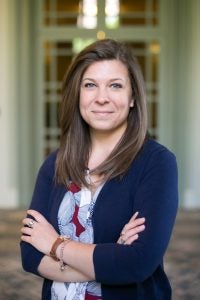By Emelia Abbe, Doctoral Student, English Language and Literature
I’ve never been sold on the idea of a strictly academic career path. As a student in the humanities, I’ve constantly wrestled with how to make sense of the greater effects of my discipline on audiences outside of the university. The circular concept of researching to write articles that other academics then use to write more articles for still more academics is a frustrating one to me — especially when I know that engaging more people outside of universities in humanities programming (museum exhibits, community literacy workshops, documentary film-making, etc.) has so much potential for building dialogues, challenging viewpoints, and disrupting echo chambers of many kinds. That frustration has only grown with seeing humanities scholars and programmers having to constantly justify the inherent value of those disciplines to university administrators and congressional legislators. So, last summer, I took a Rackham Public Engagement Fellowship in the Grants Programs department of the Michigan Humanities Council.
Prior to starting my fellowship, I had a vague idea of what state humanities councils do — knowing, for instance, that the Michigan Humanities Council organizes statewide literacy and cultural programs that get different communities across the state engaging with one another. I didn’t know, however, that state humanities councils have been leading advocacy efforts to demonstrate the importance of the humanities to the current presidential and congressional administrations, and to the public at large. They’ve been working tirelessly as a coalition to develop ways to more tangibly show the impact of the humanities cross-culturally and cross-generationally. This was the palpable atmosphere that I inhabited for the duration of my fellowship. Directly participating in building those impact measures was the most rewarding part of my experience.
The most significant project that I undertook for the MHC was interacting with other state councils to find out about how they reviewed and revised their practices for evaluating humanities programs — who were their programs reaching? What were those audiences learning? What action are they taking as a result of having participated in humanities programs? Had they discovered a new point of view about a particular topic or people group? In short, how can you tell what effect your program had on a given audience in way that someone, who perhaps has no investment in that type of program, might see its impacts? My job, after collecting all of the different responses and suggestions, was to then revise the Michigan Council’s own audience surveys, evaluations, and reports to collect data that showed why the humanities matter.
This seemed like an extremely tall order at the time. After all, this is the same question that I’ve been struggling to answer since first declaring my English literature and comparative religion double majors as an undergraduate student. My entire academic career has had that question looming over it — from justifying my choices as a student to family members or college friends, to trying to explain to my own students why they should consider making those same choices. But as I began researching and developing new evaluation standards for the Michigan Humanities Council, I realized that it is possible to get answers to the question of why the humanities matter, and in terms that aren’t overly philosophical, jargon-heavy, or abstract. It’s possible to see, in very simple and practical terms, how a humanities program — a museum exhibit, a cultural demonstration, or a creative writing workshop, for instance — have real effects on the people who participate.
As I developed key questions for the MHC’s surveys, alongside my supervisors, I found that we had to shift our focus from how to better develop humanities programs, to how to better impact the people who attend them. Taking a more outward-facing approach let us develop survey models that could clearly demonstrate the reasons behind a person’s participation in a given event, and how that event inspired, motivated, or moved them to learn more about a given culture or community, and to become a more sensitive and active partner to them.


